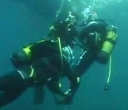Training
IAHD Discover Scuba Diving Programs
Discover Scuba Diving (DSD) programs introduce scuba diving to any interested person, age 10 and above, in a safe, controlled pool setting. For qualified divers, the Advanced DSD program allows qualifed divers to expand the DSD experience into open water. Classes are supervised by IAHD-certified professionals. Note: DSD is not a certification level class. Medical approval from the diver’s physician is required for this and all IAHD diving programs.
IAHD Confined Water Diver
Confined Water Diver is a diver certification for use in pools only. Designed for those who enjoy the exercise and fun while scuba diving but are unable or don’t desire to explore diving in open water, this certification allows divers to conduct subsequent IAHD-supervised dives in pools.
IAHD Sport Diver
The IAHD Sport Diver course is an entry level open water scuba certification that provides candidates ages 12 and up with the necessary knowledge and skills required to dive safely in an open water environment under direct supervision of an IAHD-certified professional. Certified IAHD Sport Divers may dive to a maximum depth of 40 feet.
IAHD Open Water Diver
The Open Water Diver course provides the knowledge and skills required to safely dive in an open-water environment, accompanied by two or three certified support divers or IAHD-certified dive professionals. The course is performance based and specific academic & waterskills requirements must be met in order to complete the program. Upon completion of the course you receive the appropriate Open Water Diver certification based upon your level of dependency and your ability to assist your fellow divers. Max. depth is 130 feet.
IAHD Advanced Open Water Diver
The IAHD Advanced Open Water Diver Course is designed to provide the candidate with greater supervised dive experience, while furthering their academic knowledge and diving skills. The course focuses mainly on open water dives augmented by brief academic sessions. A minimum of 5 dives is required for certification. There are no compulsory dives. Together with your IAHD instructor, you can make your own program.
IAHD Specialty Diver
The Specialty Diver Program is adaptable to suit the interests and abilities of each diver. Some of the most popular courses are:
• Enriched Air (Nitrox) Diver – our #1 specialty course!
• Fish Identification
• Night Diver
• Peak Performance Buoyancy
• Equipment Specialist I & II
• Dry Suit Diver
• Wreck Diver
• Propulsion Vehicle Diver
• Deep Diver
• Underwater Videography
• Search & Recovery Diver
• Boat Diver
• Multi-Level & Computer Diver
• Underwater Digital Photography
• Underwater Hunter
• Oxygen Provider
• Underwater Navigation Diver
IAHD Surface Support Specialist
This is a non-diving certification class. The course introduces the participant to divers’ needs before and after the dive, including equipment and dive procedures specific to handicapped divers.
IAHD Dive Partner
The Dive Partner course is designed to allow certified divers, who have completed an RSTC-recognized non-adaptive scuba training program, to be certified to fill the key role of a certified support diver for an IAHD-certified adaptive scuba diver. An IAHD Dive Partner is specially trained in how to dive with a disabled diver. Candidates get first hand experience in understanding some of the problems encountered by disabled divers. Minimum age is 16 years, and Dive Partners must hold Rescue Diver, First Aid, CPR & O2 Provider certifications from recognized training organizations. They must also have a minimum of 20 logged dives with experience in navigation and night diving.
IAHD Pro-Training
The IAHD Pro-Training is a totally integrated program for Divemasters, Assistant Instructors and Instructors which consists of two to three days of classroom, pool and open water training. Candidates learn:
• To be able to relate to some of the common psychological aspects of disabled persons.
• The characteristics of various physical disabilities, and how they relate to scuba diving.
• To recognize and adapt to some of the unique characteristics of mental & emotional disabilities.
• How to overcome some of the problems you may encounter when training physically disabled divers, through simulations and workshops in both confined and open water environments.
• Proven methods for assisting those with sight impairment, hearing impairment, spinal injuries, amputations, and other disabilities.
• How to adapt and modify normal diving equipment to the needs of the disabled diver.
• To anticipate the needs and attitudes of challenged students and to develop a foresight in logistic awareness and considerations.


